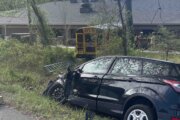MARI YAMAGUCHI
Associated Press
TOKYO (AP) — A Japanese nuclear plant won preliminary approval for meeting stringent post-Fukushima safety regulations Wednesday, an important step toward restarting the country’s first reactors under the tighter rules applied after the 2011 disaster.
The Nuclear Regulation Authority accepted a report that found the design upgrades and safety improvements at Kyushu Electric Power Co.’s two reactors at the Sendai Nuclear Power Station have complied with the requirements introduced last July.
The regulators deemed the plant capable of avoiding severe accidents in situations equal to what occurred at Fukushima Dai-ichi, where an earthquake and tsunami critically damaged the plant, causing reactor meltdowns that released radiation into the nearby community. All of Japan’s 48 remaining reactors are offline for safety checks and repairs since the 2011 disaster.
Five regulatory commissioners unanimously agreed to move to a next step, a 30-day technical public comment period beginning Thursday until Aug. 15 before a final approval.
Authority chairman Shunichi Tanaka called it “a major step” and that the inspection for the Sendai plant incorporated lessons from Fukushima, particularly focusing on ways to build layers of protection in case of serious incidents in a country prone to natural disasters, including volcanic activity, earthquakes, tsunami and typhoons.
“Previously, safety inspections were merely design-based, but this time we focused on how to prevent severe accidents,” he told a weekly commissioners’ meeting, which was repeatedly disrupted with anti-nuclear protesters heckling from the floor.
Multi-layer steps are mainly to protect the reactor core and its containment chamber from damage, and plans are also underway to reduce radiation leaks to a fraction of the amount released in Fukushima. The operator upgraded the equipment’s seismic resistance and were to triple the tsunami seawall to 15 meters (50 feet), Tanaka said. Other risks such as terrorist attacks, airplane strikes and violent volcanic explosions also have been considered.
The Sendai plant is surrounded by at least five active volcanos. Commissioner Kunihiko Shimazaki, a seismologist, said it’s difficult to accurately predict eruptions but current assessment suggests a catastrophic eruption is “extremely unlikely.”
Though public opposition over restarts exceeds support, Prime Minister Shinzo Abe’s government has been calling for restarts, saying a prolonged shutdown hurts Japan’s economy and reversing a nuclear phase-out policy adopted by the previous government. The safety approval for the Sendai plant and its expected restart marks a big boost for the nuclear industry.
“I take this as a step forward,” Abe told reporters. “When there is a final decision that the plant is safe, we will proceed with a plan to restart the reactors, while trying to gain understanding from local communities and the residents.”
It will still take a few more months to get the No. 1 and No. 2 reactors at Sendai Nuclear Power Station online, officials said. The operator has to clear final steps such as on-site checks, followed by obtaining local government consent, before the two reactors resume operations. Two reactors in western Japan had been briefly reactivated to avoid summertime power crunch but have been since switched off pending safety checks.
Opponents say the approval is premature, because some of the key safety measures including filtered vents to reduce radiation leaks can wait for two years and communities still lack adequate evacuation plans. They say regulators are too optimistic to assume a massive volcanic eruption is unlikely, and they worry if adequate protection is considered in case of contaminated water leaks as in Fukushima.
Many Japanese nuclear reactors years ago had been built fairly close to densely populated areas based under loose safety standards and evacuation requirements. Recent simulations and drills in some communities showed it would take more than two days for all residents to evacuate out of the zone.
“Japan is a volcanic island. Volcanoes are considered a weak point for Japan,” said Terukatsu Yoshida, who was among dozens of protesters who opposed the Sendai plant’s restart outside the authority’s building in Tokyo.
The Sendai plant is 1,000 kilometers (600 miles) southwest of Tokyo and on the southern tip of Japan’s Kyushu island. Regulators in March placed the plant, which operates two of 19 reactors nationwide that are undergoing safety checks, on a fast-track for safety approval, largely because the operator was quick to raise the bar on tsunami and earthquake safety.
Regulators will now shift to screening the remaining 17 reactors that applied for inspection.
Copyright 2014 The Associated Press. All rights reserved. This material may not be published, broadcast, rewritten or redistributed.







